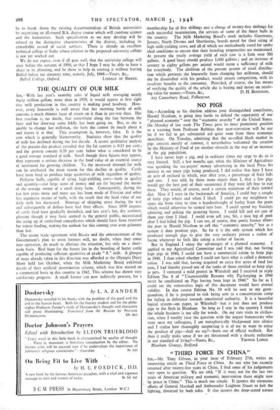NO PIGS
Stg,—According to his election address your distinguished contributor, Harold Nicolson, is going into battle to defend the superiority of our " planned economy " over the " economic anarchy " of the United States.
On Monday of last week The Times gave its most prominent position to a warning from Professor Robbins that near-starvation will be our lot if we fail to get substantial aid quite soon from these economic anarchists. On Tuesday, admitting that the so-called black market in pigs consists mostly of rumour, it nevertheless welcomed the creation by the Ministry of Food of yet another obstacle in the way of an increase in the pig population.
I have never kept a pig, and in ordinary times my urge to do so is very limited. Still, a few months ago, when the Minister of Agriculture was spending the tax-payers' money advertising in the local Press his anxiety to see more pigs being produced, I did realise that here I have an acre of orchard in which, year after year, a percentage of fruit falls and rots. I was told, by those more expert than I, that a few pigs would get the best part of their sustenance if they were left free to run there. They would, of course, need a certain minimum of their normal diet. Now if I were•in the backwoods of America, I could buy a couple of baby pigs where and when t liked. I could get my neighbour to spare me from time to time a hundredweight of barley from the grain which would otherwise be turned into beer. I could spend my Sundays admiring and poking the grunting beasts. , I could kill and eat one of them any time I liked. I could even sell you, Sir, a nice leg of pork
after I had killed the pig. I can see, of course, poetic licence allows the poet in Harold Nicolson to call this " economic anarchy," but as a system it does produce pigs. So far it is the only system which has produced enough pigs to give the very ordinary person a rasher of bacon whenever he feels like eating a ,rasher of bacon.
But in England I enjoy the advantages of a planned economy. I applied to my Agricultural Committee and I was told that, not having kept pigs in 1940, I could not have a commercial ration to keep pigs in 1948. I then asked whether I could not have what is called a domestic ration. I was told that, having acquired an extra five acres of land last year, I had thereby passed out of the ranks of those entitled to keep pigs as pets. I ventured a mild protest in Whitehall and I received in reply Edition No. 8 of " Unanswerable Reasons why Pig-keeping in 1948 must. be conditional on Pigs having been kept in 1940." So far as I could see the remorseless logic of this document would have eternal validity. In due course Edition No. 50 will be sent to my great- grandson, if he is prepared to risk being sent to a concentration camp for failing in deference towards constituted authority. It is a beautiful logical system—on paper, in Whitehall—but it just does not produce pigs in the flesh in Blunham. So long as I stay in the country I think the -whole business is too silly for words. On my rare visits to civilisa- tion, when I meekly raise the question with the august bureaucrats who were once my colleagues, I am metaphorically bludgeoned into silence and I realise how thoroughly unsporting it is of me to want to enjoy the produce of pigs—shall we say?—born out of official wedlock. But does it really make sense if we are threatened with a drastic reduction






























 Previous page
Previous page